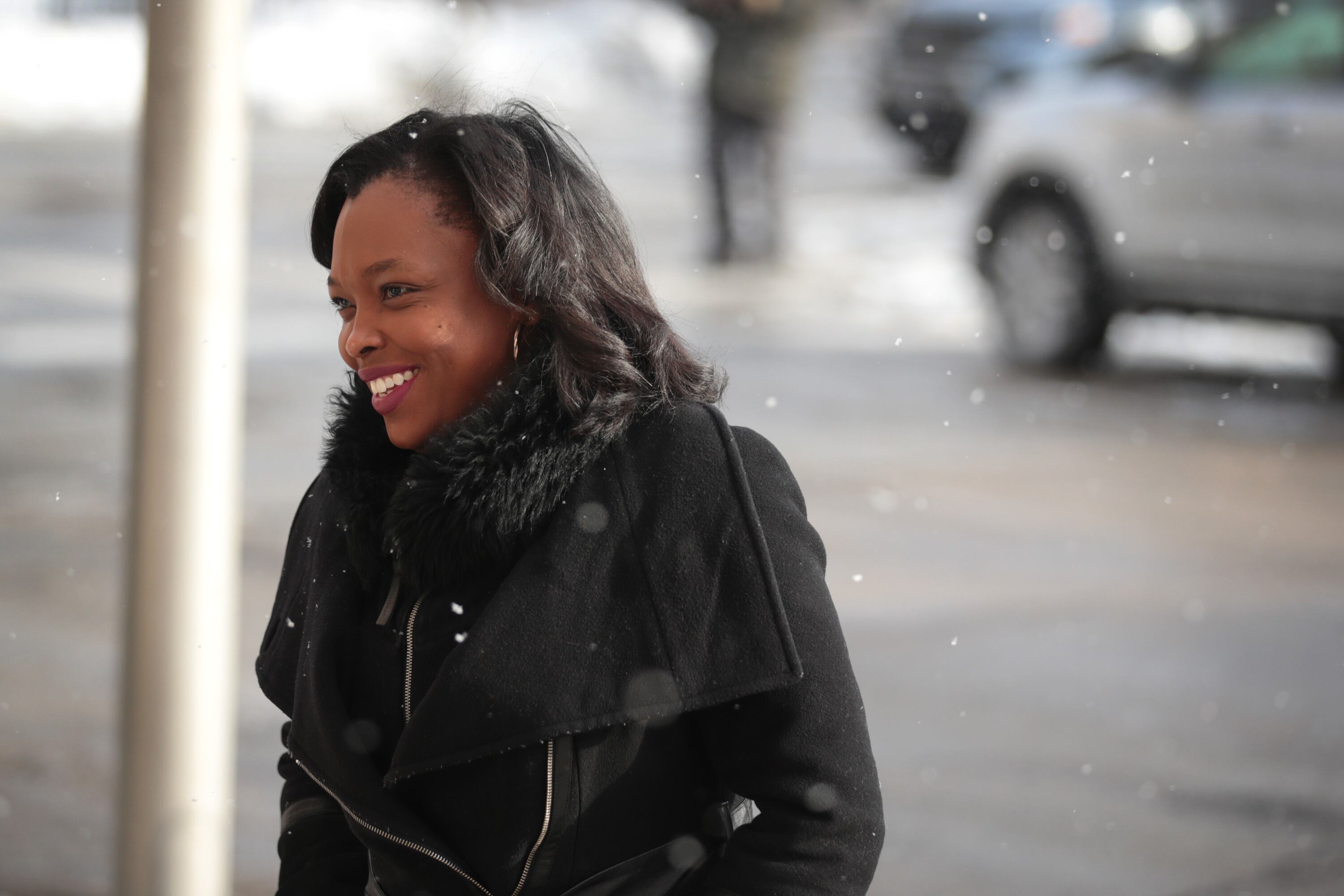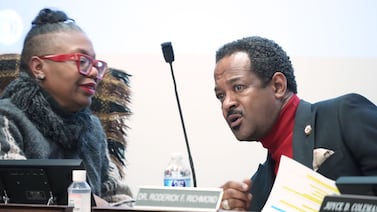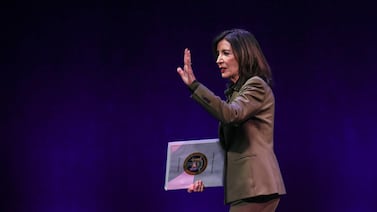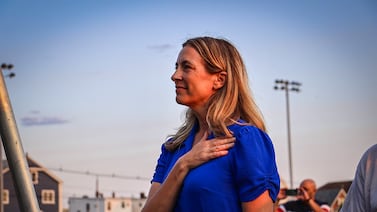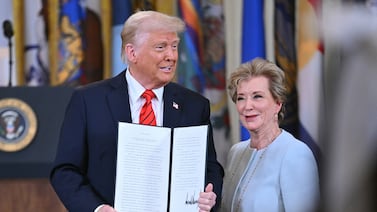Janice Jackson, whose three-and-a-half year tenure was marked by record high graduation rates, a pandemic, and a tumultuous teachers strike, will step down as head of the nation’s third largest school district when her contract expires in June.
Jackson, who frequently called the CEO of Chicago Public Schools role her “dream job,” confirmed the news Monday in a letter to staff. She said she chose not to renew her contract after a challenging year full of issues that required round-the-clock attention and took her energy away from her school-age children.
Blinking back tears at a press conference, Jackson said that she was not leaving the district to run another and planned to stay active in public education — and in the short term, at least, spend more time with her family.
“I have lived my entire life and served this district for 22 years. It is with a full heart, and a grateful heart, that I have chosen not to renew my contract. This job has been everything I dreamt of — and sometimes a little bit more than that,” said Jackson, who added that the year had left her “a little tired.”
Jackson joins a wave of high-profile superintendents — including in Los Angeles, New York, and Broward County, Fla. — who have retired, resigned, or announced intentions to do so, in some cases citing similar fatigue.
Before she steps down at the end of the school year, Jackson said she planned to press ahead with a full-time reopening this fall for the district’s 340,600 school children and launch two much-touted plans that have not yet been detailed for the public: a learning recovery plan to address the academic and social-emotional fallout from the pandemic and a $135 million curriculum overhaul that will create a centralized learning plan for Chicago’s schools.
“While I feel there is still more work to be done in CPS, I also believe it is time to pass the torch to new leadership for the next chapter,” she wrote in the letter earlier in the day.
Chicago Mayor Lori Lightfoot, who said Jackson notified her previously that she planned to step down, said Monday that the city had retained a search firm to engage in a national search for a new CEO.
Chief Operating Officer Arnie Rivera also is stepping down, school officials confirmed Monday. Rivera organized the district’s free meal program during the pandemic and played a key role in negotiations with the teachers union during the 2019 strike and again during negotiations to reopen campuses in the pandemic.
Jackson said in a letter to some staff members that Rivera will depart the district “in the coming weeks” and that the district had appointed Lindy McGuire, Rivera’s current deputy, to serve as acting chief operating officer as it conducts a search for the next COO.
The departures come only months after the district’s No. 2, LaTanya McDade, announced she would be leaving Chicago to lead Virginia’s second largest school district.
The vacancies leave Chicago Public Schools without three key leadership positions as it tries to respond to the fallout from an unprecedented closure — and receives billions in federal funding to spend in response.
Jackson made several lasting changes as she steered the district through a year of building closures during the COVID-19 pandemic, the response to a widespread student sexual abuse scandal, a state investigation into delayed services for students with disabilities, and a bitter 11-day teachers strike in 2019. “My tenure has not been without its adversity,” she wrote. “However, from day one, I committed to own and face all of our district’s challenges head on. I thank each of you who played a role in helping us navigate those challenges by showing up daily with unwavering commitment to Chicago’s children. Despite a disruptive year, CPS is emerging stronger than ever.”
Challenges then and now
Jackson traces her experiences with Chicago Public Schools back to the Head Start program for preschoolers she attended as a youngster growing up in a family of five children in the Auburn Gresham neighborhood on Chicago’s South Side.
She attended high school at Hyde Park High School, became a teacher and later founded her own school, at age 27, on Chicago’s West Side. From there, she held a series of key district positions before she was appointed to the job of network chief in 2014 overseeing two dozen schools. That’s when Mayor Rahm Emanuel began to talk to her about the top job. She’d go on to be named the No. 2 under former schools chief Forrest Claypool, who led the Chicago Park District and Cook County Board before taking the helm at Chicago Public Schools.
Emanuel, whom Jackson called a mentor and friend on Monday, named her to the top job in 2017 after Claypool resigned in an ethical scandal involving a top aide. Her first week in the CEO seat she was delivered a public records request from the Chicago Tribune investigating allegations of student sexual misconduct going back decades.
That event would hearken a deeply challenging next three-and-a-half years, she said — by the fall of 2019, the district’s powerful teachers union was laying the groundwork for an 11-day teachers strike. Those fault lines, once exposed between district and union leaders, would again factor into contentious talks about reopening Chicago schools during the pandemic.
Ultimately, Chicago school buildings would remain closed for nearly a year, with high school students only getting the option to return in the fourth quarter.
Jackson said Monday that the political gauntlet required to do the top schools job was brutal and ultimately did not benefit students.
“At the end of the day I’m an educator,” she said Monday. “Right now the politics in education are ugly, I think they are misplaced, and they should not get the coverage they get in my personal opinion ... All of the issues that rank-and-file teachers care about, I completely agree with. But the tactics that (union leadership) uses in order to get that, I don’t agree with, and I do think that they make it difficult for good people to do these jobs.”
In a statement Monday, the Chicago Teachers Union said that the “mass exodus” of district leaders should not be a deterrent to efforts to address the needs of Chicago’s schools and that it hoped the next CEO would enlist families and community leaders to bring the district stability after a decade that saw six CEOs.
“We are hopeful the mayor can improve on her ability to work collaboratively and cohesively with others, in particular her own staff and appointees in CPS,” the statement attributed to union leadership said, “because trauma support, special education and bilingual education resources, and equitable spending of federal funding remain high priorities for families and educators.”
Leaving her mark
Despite the myriad challenges, Jackson — who took the helm after a string of bureaucrats without classroom experience — often was celebrated as a homegrown CEO whose resume in schools throughout the district gave her particular insights to the challenges of running Chicago schools.
In 2019, just weeks before Lightfoot was sworn in as mayor to succeed Emanuel, Jackson announced a five-year vision plan in which she pledged to raise the achievement levels of Black and Latino students, boost the city’s high school graduation rate to 90%, and restore public trust in a school district that was under monitoring for violating the rights of students with disabilities and mishandling of student sexual abuse cases. The district had staged a successful turnaround, she said at the time, notching sustained academic growth that included annual increases in its five-year high school graduation rate (most recently, a rate that had reached 79%).
But some student groups, including Black and Latino boys, were not achieving growth at the same rate.
“We will not realize our collective goals as a city unless we make sure the most vulnerable students in our city are meeting the same goals,” she said at the time. “Because if you only look at the progress and look at the data, it can mask troubling signs and troubling disparities that lie beneath.”
In response, she created an office of equity to help dissect test scores and graduation rates and spearhead conversations about how resources, such as school funding and capital investments, are steered to schools — one of the accomplishments she said on Monday that she was proudest of. “It has been central to my decision making,” she said.
After a contentious decade that saw a proliferation of charter and selective-enrollment schools, she reenergized the district’s approach to its neighborhood campuses, launching a series of equity grants intended to bolster sagging enrollment and investing millions in programs intended to lure students back, such as International Baccalaureate and science and arts programs.
On Monday, she also spoke about responding to community demand and opening up two new South Side campuses: a new classical elementary school in Bronzeville and a STEM campus in Englewood, which the district opened amid the controversial closing of four area high school campuses.
Jackson said Monday that she planned to stay involved and joked that she might even run for a seat on the city’s elected school board if it could get it up and running — a nod to yet another divisive education issue as legislators battle over a proposal that would reshape city school governance.
“You will not see me running another school district,” she said, “but I will continue to devote my life to public education.”

